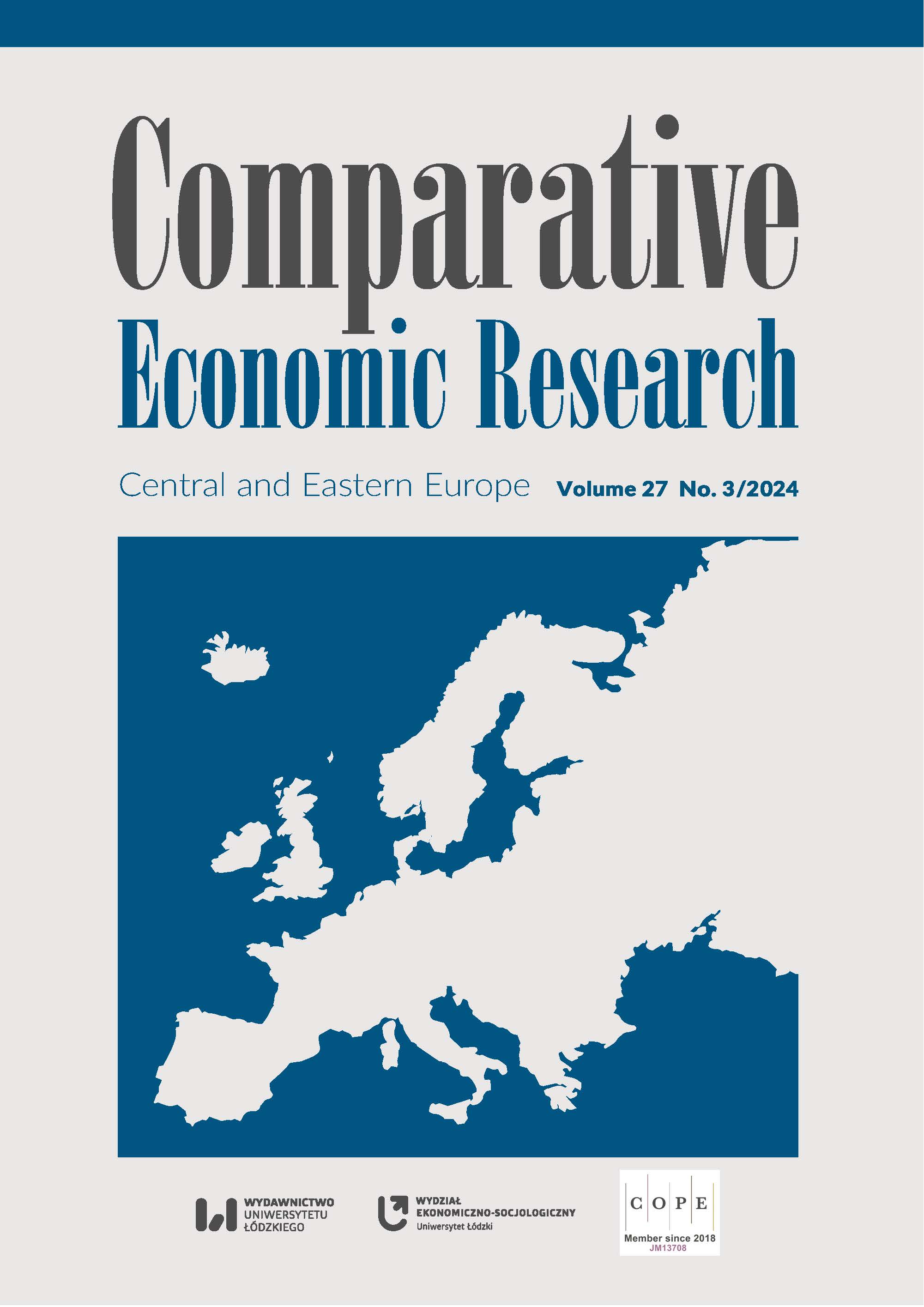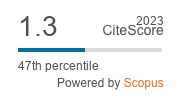Levels of Renewable Energy Use in Selected European Union Countries – Statistical Assessment of Changes and Prospects for Development
DOI:
https://doi.org/10.18778/1508-2008.27.24Keywords:
renewable energy, European Union, forecasting methods, development perspectivesAbstract
The search for and use of green energy sources is an important course of action for the European Union (EU). The paper compares the 13 EU countries that acceded to the EU in 2004 and afterwards in terms of the level of renewable energy use. The primary indicator used to assess the use of renewable energy sources (RES) was the share of renewable energy in gross final energy consumption from 2007 to 2021. Statistical data were sourced from the Eurostat database. The results of the study confirm that between 2007 and 2021, there were positive changes in the use of renewable energy in most of the countries. The prospects for renewable energy development in these countries were assessed by constructing forecasts of the indicator concerning the share of renewable energy in gross final energy consumption for 2022–2024. For most of the countries, the forecasts were highly and sufficiently precise, meaning the countries have a chance of meeting the RES targets set out in EU directives.
Downloads
References
Aczel, A.D. (2000), Statystyka w zarządzaniu, Wydawnictwo Naukowe PWN, Warszawa.
Google Scholar
Anastasiu, N., Simionescu, B.C., Popa, M.E., Mihai, M., Rusu, R.D., Predeanu, G. (2018), Romanian coal reserves and strategic trends, “International Journal Coal Geology”, 198, pp. 177–182, https://doi.org/10.1016/j.coal.2018.09.011
Google Scholar
DOI: https://doi.org/10.1016/j.coal.2018.09.011
Bekirsky, N., Hoicka, C.E., Brisbois, M.C., Camargo, L.R. (2022), Many actors amongst multiple renewables: A systematic review of actor involvement in complementarity of renewable energy sources, “Renewable and Sustainable Energy Reviews”, 161, 112368, https://doi.org/10.1016/j.rser.2022.112368
Google Scholar
DOI: https://doi.org/10.1016/j.rser.2022.112368
Cieślak, M. (ed.) (2001), Prognozowanie gospodarcze. Metody i zastosowanie, Wydawnictwo Naukowe PWN, Warszawa.
Google Scholar
Communication from the commission to the European Parliament, The European Council, The Council, The European Economic and Social Committee and the Committee of the Regions. The European Green Deal, COM/2019/640 final, https://eur-lex.europa.eu/legal-content/EN/TXT/?uri=CELEX:52019DC0640 (accessed: 7.03.2023).
Google Scholar
Daroń, M., Wilk, M. (2021), Management of Energy Sources and the Development Potential in the Energy Production Sector – A Comparison of EU Countries, “Energies”, 14 (3), 685, https://doi.org/10.3390/en14030685
Google Scholar
DOI: https://doi.org/10.3390/en14030685
Devine-Wright, P. (2019), Community versus local energy in a context of climate emergency, “Nature Energy”, 4, pp. 894–896, https://doi.org/10.1038/s41560-019-0459-2
Google Scholar
DOI: https://doi.org/10.1038/s41560-019-0459-2
Directive 2001/77/EC of the European Parliament and of the Council of 27 September 2001 on the Promotion of Electricity Produced from Renewable Energy Sources in the Internal Electricity Market, Council of the European Union, Brussels, https://eur-lex.europa.eu/legal-content/EN/TXT/PDF/?uri=CELEX:32001L00s77&from=ES (accessed: 10.02.2023).
Google Scholar
Directive 2003/30/EC of the European Parliament and of the Council of 8th May 2003 on the promotion of the use of biofuels or other renewable fuels for transport, Official Journal of the European Union 2003, L123, 42–46, https://eur-lex.europa.eu/eli/dir/2003/30/oj (accessed: 10.02.2023).
Google Scholar
Directive 2009/28/EC of 23rd April 2009 on the Promotion of the Use of Energy from Renewable Sources and Amending and Subsequently Repealing Directives 2001/77/EC and 2003/30/EC, Council of the European Union, Brussels, https://eur-lex.europa.eu/LexUriServ/LexUriServ.do?uri=OJ:L:2009:140:0016:0062:en:PDF (accessed: 10.02.2023).
Google Scholar
Directive 2018/2001/EU of the European Parliament and of the Council of 11th December 2018 on the Promotion of the Use of Energy from Renewable Sources, Brussels, https://eur-lex.europa.eu/eli/dir/2018/2001/oj (accessed: 8.02.2023).
Google Scholar
European Commission (2020), Individual assessments, https://energy.ec.europa.eu/individual-assessments_en (accessed 10.03.2023).
Google Scholar
Eurostat (n.d.), Database, https://ec.europa.eu/eurostat/data/database (accessed: 21.02.2023).
Google Scholar
Frątczak, E. (2015), Statistics for management and economics, Warsaw School of Economics, Warsaw.
Google Scholar
Gaigalis, V., Katinas, V. (2020), Analysis of the renewable energy implementation and prediction prospects in compliance with the EU policy: A case of Lithuania, “Renewable Energy”, 151, pp. 1016–1027, https://doi.org/10.1016/j.renene.2019.11.091
Google Scholar
DOI: https://doi.org/10.1016/j.renene.2019.11.091
Gorczyca, M. (2011), Energy from renewable sources in Poland as compared to other EU countries, “Energetyka i Ekologia”, pp. 515–518, https://elektroenergetyka.pl/upload/file/2011/8/Gorczyca.pdf (accessed: 8.02.2023).
Google Scholar
Hoicka, E.E., Lowitzsch, J., Brisbois, M.C., Kumar, A. (2021), Implementing a just renewable energy transition: Policy advice for transposing the new European rules for renewable energy communities, “Energy Policy”, 156, 112435, https://doi.org/10.1016/j.enpol.2021.112435
Google Scholar
DOI: https://doi.org/10.1016/j.enpol.2021.112435
Johansson, B. (2013), Security aspects of future renewable energy systems – A short overview, “Energy”, 61, pp. 598–605, https://doi.org/10.1016/j.energy.2013.09.023
Google Scholar
DOI: https://doi.org/10.1016/j.energy.2013.09.023
Koltsaklis, N.E., Dagoumas, A.S., Seritan, G., Porumb, R. (2020), Energy transition in the South East Europe: the case of the Romanian power system, “Energy Reports”, 6, pp. 2376–2393, https://doi.org/10.1016/j.egyr.2020.07.032
Google Scholar
DOI: https://doi.org/10.1016/j.egyr.2020.07.032
Kruk, H. (2012), Wykorzystanie źródeł energii a bezpieczeństwo energetyczne i ekologiczne Polski, “Zeszyty Naukowe Akademii Morskiej w Gdyni”, 72, pp. 23–39.
Google Scholar
Kryszk, H., Kurowska, K., Marks-Bielska, R., Bielski S., Eźlakowski, B. (2023), Barriers and Prospects for the Development of Renewable Energy Sources in Poland during the Energy Crisis, “Energies”, 16 (4), 1724, https://doi.org/10.3390/en16041724
Google Scholar
DOI: https://doi.org/10.3390/en16041724
Latkowska, B., Fitko, H., Stelmach, S. (2011), Ocena właściwości paliwowych ubocznego produktu z produkcji bioetanolu, “Inżynieria Ekologiczna”, 25, pp. 222–230.
Google Scholar
Łuczak, A., Kalinowski, S. (2022), A multidimensional comparative analysis of poverty statuses in European Union countries, “International Journal of Economic Sciences”, XI (1), pp. 146–160, https://doi.org/10.52950/ES.2022.11.1.009
Google Scholar
DOI: https://doi.org/10.52950/ES.2022.11.1.009
Mišík, M. (2022), The EU needs to improve its external energy security, “Energy Policy”, 165, 112930, https://doi.org/10.1016/j.enpol.2022.112930
Google Scholar
DOI: https://doi.org/10.1016/j.enpol.2022.112930
Molo, B. (2016), Polityka Unii Europejskiej a rozwój odnawialnych źródeł energii w Niemczech, “Rocznik Integracji Europejskiej”, 10, pp. 121–142, https://doi.org/10.14746/rie.2016.10.8
Google Scholar
DOI: https://doi.org/10.14746/rie.2016.10.8
Năstase, G., Șerban, A., Năstase, A.F., Dragomir, G., Alin Ionuț Brezeanu, A.I. (2018), Air quality, primary air pollutants and ambient concentrations inventory for Romania, „Atmospheric Environment”, 184, pp. 292–303, https://doi.org/10.1016/j.atmosenv.2018.04.034
Google Scholar
DOI: https://doi.org/10.1016/j.atmosenv.2018.04.034
Ociepa-Kubicka, A. (2015), Wykorzystanie biomasy w przedsiębiorstwach energetycznych, “Proceedings of ECOpole”, 9 (1), pp. 279–286, https://doi.org/10.2429/proc.2015.9(1)036
Google Scholar
Olczak, K. (2016), Polityka Unii Europejskiej w odniesieniu do odnawialnych źródeł energii – ramy prawne, “Studia Prawno-Ekonomiczne”, 101, pp. 87–97.
Google Scholar
Papież, M., Śmiech, S., Frodyma, K. (2018), Determinants of renewable energy development in the EU countries. A 20-year perspective, “Renewable and Sustainable Energy Reviews”, 91, pp. 918–934, https://doi.org/10.1016/j.rser.2018.04.075
Google Scholar
DOI: https://doi.org/10.1016/j.rser.2018.04.075
Pérez, M., Scholten, P., Smith Stegen, K. (2019), The multi-speed energy transition in Europe: Opportunities and challenges for EU energy security, “Energy Strategy Reviews”, 26, 100415, https://doi.org/10.1016/j.esr.2019.100415
Google Scholar
DOI: https://doi.org/10.1016/j.esr.2019.100415
Rajchel, D., Walawender, A., (2018), Renewable energy in the European Union and in Poland, including households, [in:] S. Sitek (ed.), „Stare i nowe” problemy badawcze w geografii społeczno-ekonomicznej, z. 8, Polskie Towarzystwo Geograficzne Oddział Katowicki, Uniwersytet Śląski Wydział Nauk o Ziemi, Sosnowiec, pp. 161–176.
Google Scholar
Stec, M., Grzebyk, M. (2022), Statistical Analysis of the Level of Development of Renewable Energy Sources in the Countries of the European Union, “Energies”, 15 (21), 8278, https://doi.org/10.3390/en15218278
Google Scholar
DOI: https://doi.org/10.3390/en15218278
Ustawa z dnia 20 lutego 2015 r. o odnawialnych źródłach energii (Dz.U. z 2015 r., poz. 478).
Google Scholar
Van de Graaf, T. (2018), Battling for a Shrinking Market: Oil Producers, the Renewables Revolution, and the Risk of Stranded Assets, [in:] D. Scholten (ed.), The Geopolitics of Renewables, Springer, Cham, pp. 97–121, https://doi.org/10.1007/978-3-319-67855-9_4
Google Scholar
DOI: https://doi.org/10.1007/978-3-319-67855-9_4
Wawrzyniak, D. (2016), Standard of Living in the European Union, “Comparative Economic Research. Central and Eastern Europe”, 19 (1), pp. 139–153, https://doi.org/10.1515/cer-2016-0008
Google Scholar
DOI: https://doi.org/10.1515/cer-2016-0008
Wiśniewska, M., Pusz, A., Rogalski, D. (2020), Development of renewable energy sources (RES) in the European Union and Poland, “Polish Journal for Sustainable Development”, 24, pp. 101–112, https://doi.org/10.15584/pjsd.2020.24.2.12
Google Scholar
DOI: https://doi.org/10.15584/pjsd.2020.24.2.12
Załuska, M., Piekutin, J., Magrel, L. (2018), Efektywność ekonomiczna i energetyczna funkcjonowania biogazowni w zależności od zastosowanego substratu, “Budownictwo i Inżynieria Środowiska”, 9 (1), pp. 51–56.
Google Scholar
Zeliaś, A., Pawełek, B., Wanat, S. (2003), Prognozowanie ekonomiczne. Teoria, przykłady, zastosowania, Wydawnictwo Naukowe PWN, Warszawa.
Google Scholar
Żuk, P., Żuk, P. (2022), National energy security or acceleration of transition? Energy policy after the war in Ukraine, “Joule”, 6 (4), pp. 709–712, https://doi.org/10.1016/j.joule.2022.03.009
Google Scholar
DOI: https://doi.org/10.1016/j.joule.2022.03.009
Downloads
Published
How to Cite
Issue
Section
License

This work is licensed under a Creative Commons Attribution-NonCommercial-NoDerivatives 4.0 International License.
Funding data
-
Západočeská Univerzita v Plzni
Grant numbers project SGS–2023–007 ‘Current Challenges and Problems of Modern Society from the Perspective of Finances and Accounting’











